Retail professionals fulfill a wide range of positions in the retail industry, from cashiers and merchandisers to store managers. Working in retail requires a good mix of technical and interpersonal skills that give you the ability to provide excellent customer service while maintaining great organization.
In this guide, we teach you everything you need to know about writing a cover letter as a retail professional. Continue reading to learn how to:
- Craft the best header and headline for your retail cover letter
- Make the information in your cover letter personalized
- Create a compelling introduction that grabs an employer’s attention
- Showcase your professionalism in retail with skills and accomplishments
- Encourage the employer to contact you in your retail cover letter conclusion
Still looking for a job? These 100+ resources will tell you everything you need to get hired fast.
1. Craft the best header and headline for your retail cover letter
Writing an effective retail cover letter starts with giving it a pleasant visual flow.
Adding a cover letter header and cover letter headline to your document is the best way to do this. These elements provide the employer with key pieces of information that help to give an overview of who you are and what your cover letter is about.
Starting with your header, this element should contain:
- Your name and professional title
- Your professional contact information (phone number, email address, LinkedIn, etc.)
- The name of the company or employer you are applying to
- The address of the company or employer
Here is an example of a well-formatted retail cover letter header
John Doe, Retail Professional
(123) 456-7890 | johndoe@email.com | linkedin.com/in/john-doe
To: Sales Associates United
1234 Street Address
Casper, WY 82601
As far as where to place your header, it should be located in the top left corner of the page. Your personal information should be in a slightly larger font than the employer’s information to help it stand out.
A few spaces below this information and centered on the page is your cover letter headline. This is a short title or introductory statement that lets the employer know what the main point or purpose of your letter is. In this headline, you should include:
- A relevant keyword, such as the name of the position
- A memorable number or trigger word that catches the employer’s eye
- A strong adjective or verb to showcase your professional vale
- A personalized statement that lets the employer know the letter is specifically for them
Here is an example of an excellent retail cover letter headline
My 3-Step Approach to Successful Sales in Retail & How I Will Apply these Skills at Your Company
Trigger Word/Number: 3-Step Approach
Keyword: Sales, Retail
Adjective/Verb: Successful, Apply
Personalized Statement: Your Company
2. Make the information in your retail cover letter personalized
Speaking of personalization, this is one of the most important factors to consider when writing a cover letter. The term personalization (when used to describe a cover letter) means that all of the content found within the letter is tailored to be highly relevant to the employer.
Tailoring a cover letter in this way requires you to do some professional digging to uncover key facts about the employer and their business.
This may include:
- The company values
- An employee motto or pledge
- Specific staff members (especially those responsible for reviewing applications)
As part of this personalization process, you should create a personalized greeting that addresses a specific person by name, such as the hiring manager or company CEO.
Here are 3 examples of personalized cover letter greetings
- Dear Hiring Manager Jane Smith,
- Dear Ms. Jane Smith,
- Dear CEO Jack Parker,
3. Create a compelling retail cover letter introduction
The introduction to your cover letter is the first paragraph an employer will read after they have reviewed your header and headline. If your headline is effectively written, the employer should already be highly interested in what you have to say.
In turn, your introduction needs to be equally compelling to not only grab the employer’s attention but keep them interested enough to read on.
A compelling cover letter introduction will often include:
- A short summary of your professional history in retail
- Key specializations that make you a strong candidate for the position
- A mutual acquaintance (when possible) — a mutual acquaintance can include a professional associate of the employer, a current or former employee, your professional mentor, or anyone else with professional ties to the employer
Here is an example of a compelling introduction from a retail cover letter
Dear Hiring Manager Jane Smith,
I am a dedicated retail professional with 5+ years of experience working as a sales associate and merchandiser. After recently becoming acquainted with Mr. Hank Josephs, a recruiter who works closely with your company, Mr. Josephs recommended I apply to your company. Given your company’s need for a talented visual display designer, I believe my specialized experience with managing product displays makes me the perfect candidate for the position.
4. Showcase your professionalism in retail with skills and accomplishments
With your introduction out of the way, the employer should now know exactly who you are and why you are applying to their business.
Now, your next key step is to highlight all the qualifications that make you the top candidate for the job. This should include your most impressive skills and accomplishments within retail to show the employer that you bring real value to the table as a future employee.
As you describe your skills and accomplishments, keep your sentences concise and highly relevant. The employer should be able to easily skim through this information to gather the most important points.
Here are 6 retail skills to describe in a cover letter
- Exemplary customer service
- Inventory management
- Money handling and payment processes
- Organizing merchandise and product displays
- Assisting in-store customers
- Promoting new products
Here is an example of how to describe an accomplishment in a retail cover letter
In my previous retail position at [Former Employer], I was highly regarded as one of the top sales associates thanks to my exceptional customer service and positive attitude. Over the two years that I worked at this company, I received a perfect 5-star rating from customers. Additionally, I applied my leadership skills to mentor other sales associates in providing excellent customer service, leading the store’s overall rating to rise from 3.6 stars to 4.5 stars on Google.
5. Craft an effective retail cover letter conclusion
The last, but arguably most important, step to writing your retail cover letter is to create a persuasive closing statement.
You have one main goal with your conclusion — to convince the employer to contact you.
Keeping this in mind, some of the most important information to include in your conclusion is the best days and times to reach you, when you hope to hear back from the employer, and when you plan to follow up regarding your application.
Your goal is not to be overly pushy. Instead, you want to showcase your enthusiasm one last time, persuading the employer to get in touch with you quickly.
Here is an example of a great retail cover letter conclusion
I am beyond grateful to be considered for this position and look forward to hearing from you within the next week. To best reach me, please call me at (123) 456-7890 on any day during the hours of 6 a.m. to 4 p.m. I plan to reach back out via email next Tuesday if I have not heard back from you or your team about this opportunity.
With Appreciation,
[Applicant Name]
6. Job search resources for retail professionals
Ever felt like finding a job in retail is like hunting for a needle in a haystack? Fret not! From specialized job boards to the best networking platforms, here are resources that should be on every retail professional's radar:
- Retail job boards: Specialist sites like AllRetailJobs or RetailCrossing exclusively cater to the retail industry, rounding up the best opportunities — from sales associates to store managers — in one spot.
- Job search sites: Websites like Indeed, Glassdoor, and ZipRecruiter regularly list job openings in retail. Leverage their advanced search options to find openings that perfectly match your qualifications and preferences.
- Professional networking: While LinkedIn remains a top choice, also consider retail-centric networks, like The Retail Network or NRF (National Retail Federation).
- Trade associations: Organizations like the NRF or Association for Retail Environments offer industry news, resources, and networking opportunities. Joining such associations keeps you abreast of industry trends and opens doors to new prospects.
- Staffing agencies: Businesses like Adecco or Retail Options deliver recruitment services tailored for the retail industry, making them a great port of call in your job search journey.
- Company websites: Never underestimate the power of going directly to the source. Retail giants like Walmart, Macy's or Best Buy have extensive career pages detailing current vacancies.
Remember, the retail industry thrives on personality and customer interaction. Highlight these skills throughout your job search, and you'll be an asset potential employers can't overlook.
If you have ever wondered how a cover letter differs from a resume, this article will tell you everything about the key differences between the two.
Retail Cover Letter FAQ
What specific skills should I highlight in my retail cover letter?
Retail is a customer-focused industry. Therefore, top skills to highlight include customer service skills, communication abilities, and sales techniques. Don't forget about your problem-solving skills and adaptability — these show your potential employer that you can handle unexpected situations on the sales floor.
How long should my retail cover letter be?
Just like a good sales pitch, your cover letter should be concise yet compelling. Aim for one full page — around 250 to 400 words. Remember to make every sentence count.
Should I write a generic cover letter and tweak it for different job applications?
While it's okay to have a standard format, make sure each cover letter is personalized for the job you're applying for. Hiring managers can often tell if a letter’s been mass-produced, which could make your application feel less genuine.
What if the job ad doesn’t ask for a cover letter?
Even if it's not explicitly requested, including a well-crafted cover letter can show initiative and your genuine interest in the position. It gives you a chance to express aspects that your resume simply can't cover.
Should I follow up after submitting my cover letter and resume?
Generally, it’s a good idea to follow up 7-10 days after submitting your application. However, make sure to adhere to any instructions mentioned in the job posting. If it notes not to follow up, respect the employer’s process.




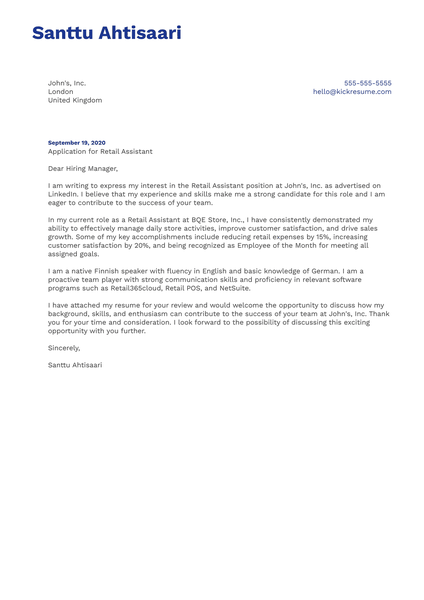


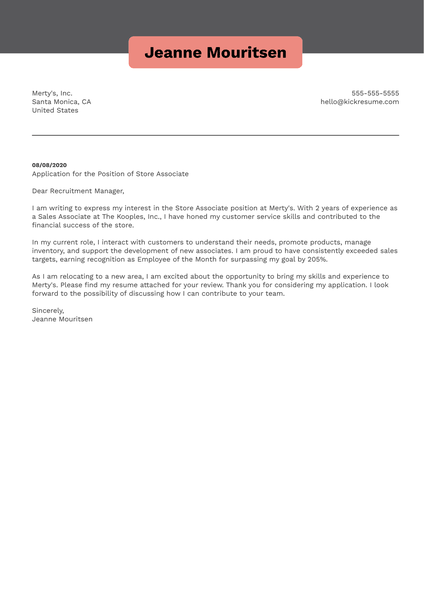
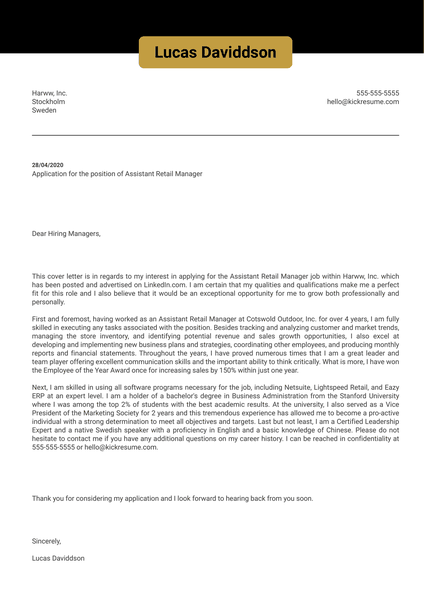
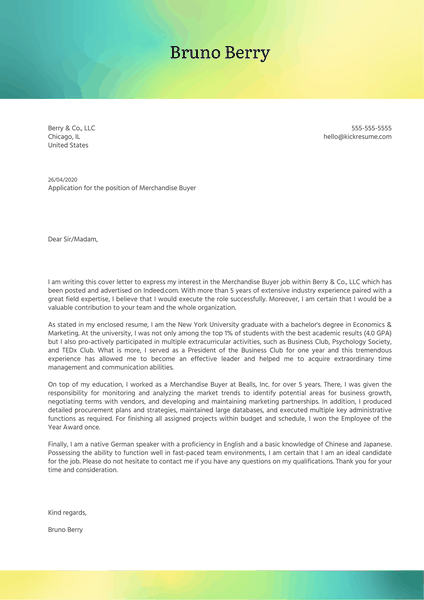
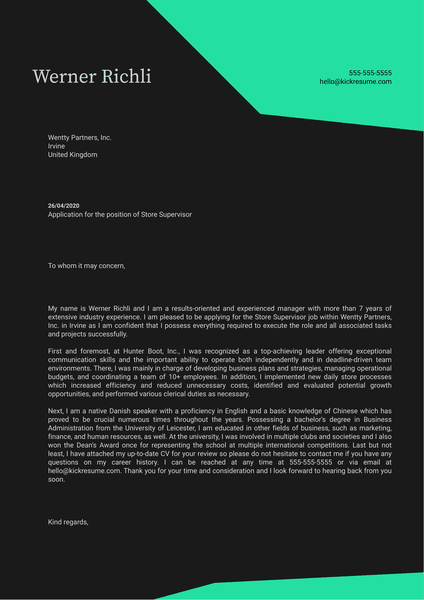

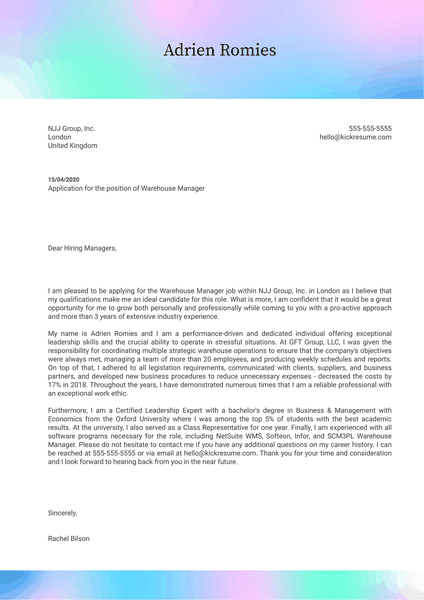

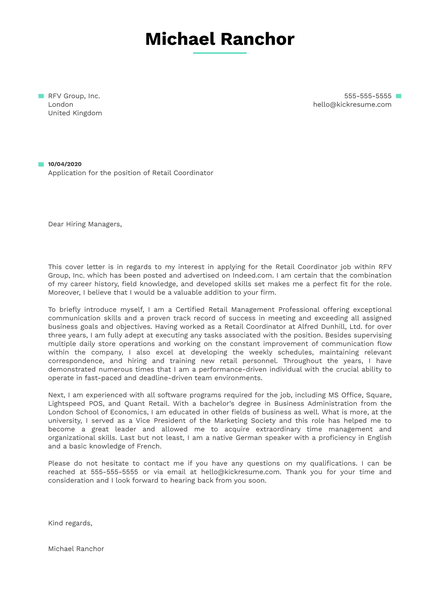
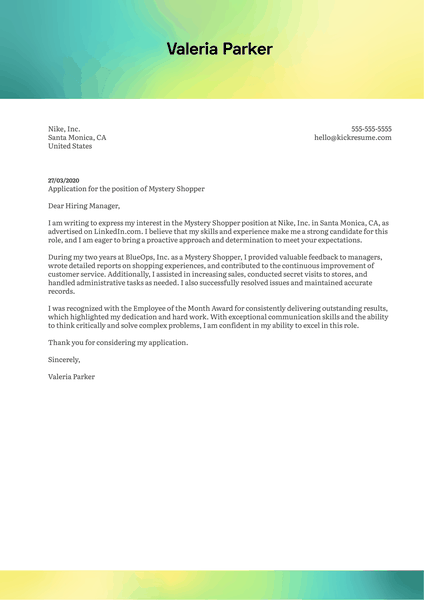
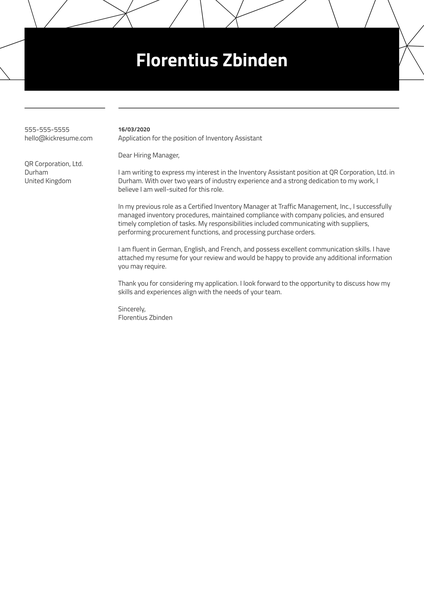
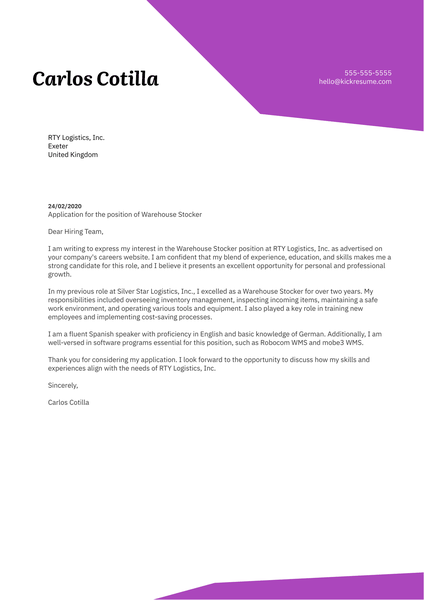

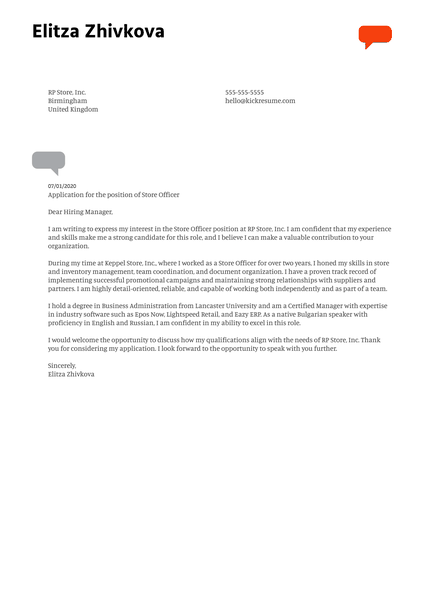
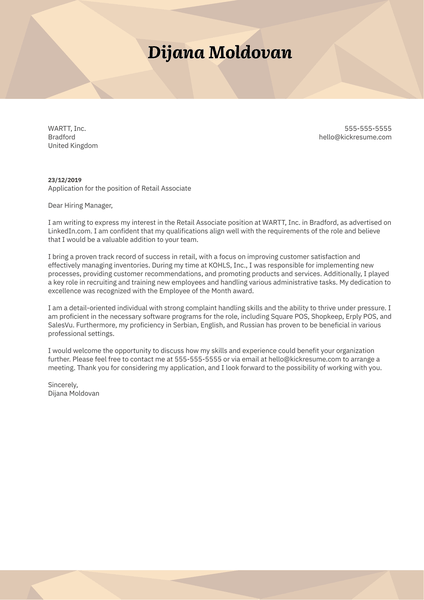

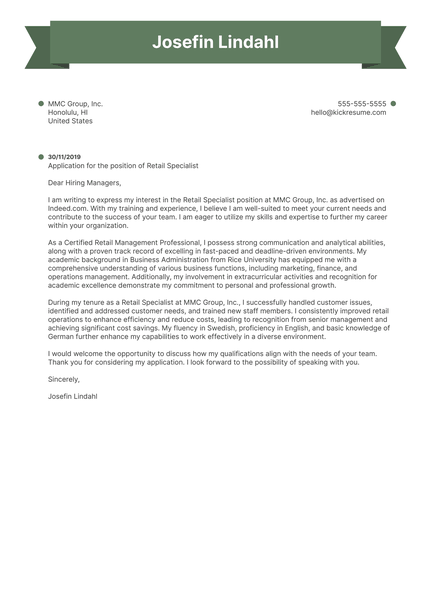
![Representante de ventas en Adidas currículum ejemplo [ES]](png/thumbnail-6.png)

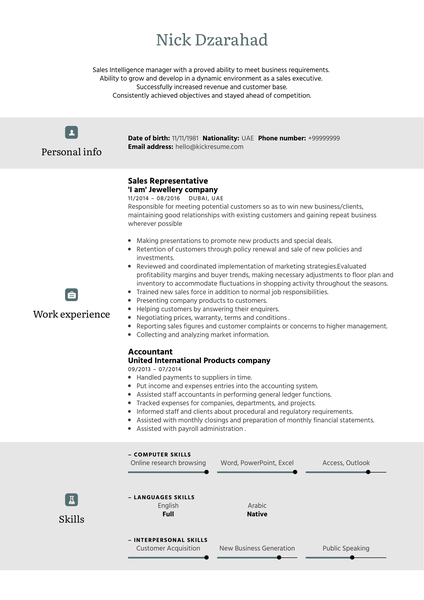
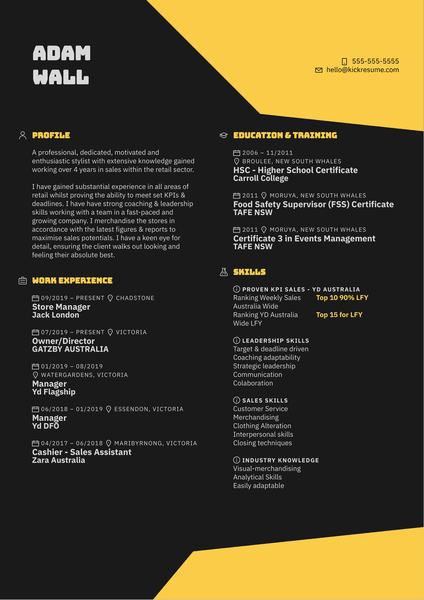

![Nike Retail Brand Specialist [SV]](png/thumbnail-592.png)

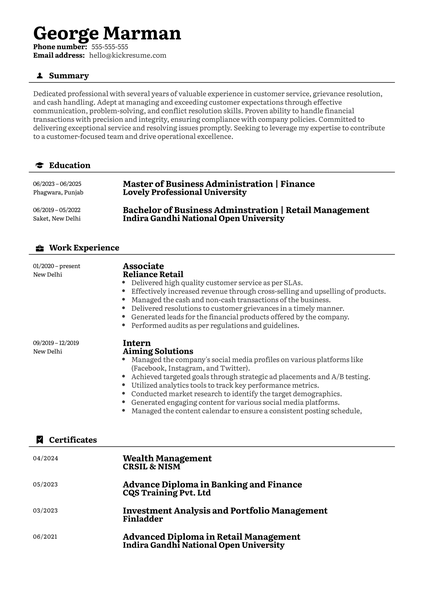

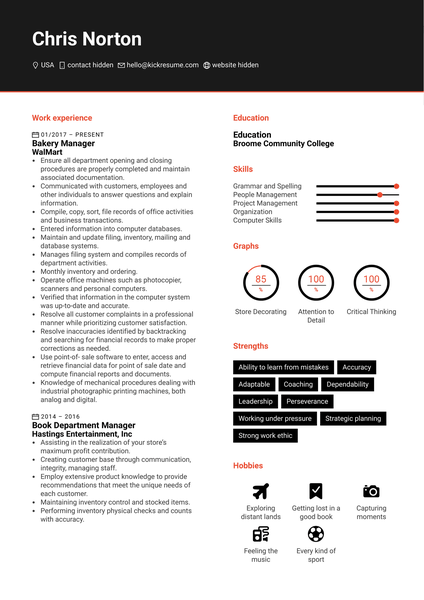
![Analista con experiencia en minorista currículum ejemplo [ES]](png/thumbnail-594.png)



